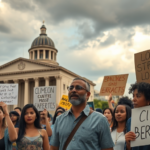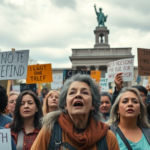**Exclusive: Corporate America’s Retreat from DEI Leaves Thousands Unemployed**
In a seismic shift within Corporate America, the retreat from diversity, equity, and inclusion (DEI) initiatives has led to more than 2,600 job eliminations since early 2023, signaling a significant contraction in a field that once promised widespread reform. According to data from workforce analytics firm Revelio Labs, this reduction constitutes 13% of the peak DEI-related positions available at that time.
Veteran DEI executive Candace Byrdsong Williams, with almost two decades of experience, is among those directly impacted. Despite her extensive portfolio, Williams found herself unemployed as of August and now faces a challenging job market marked by hostility toward DEI principles.
The Rise and Decline of DEI Initiatives
The surge in DEI roles followed the unprecedented corporate commitments made after the murder of George Floyd in 2020, when businesses vowed to combat systemic racism actively. The momentum saw over 20,000 DEI-focused positions across U.S. companies by early 2023. However, recent political dynamics, not least of which include former President Trump’s executive orders condemning DEI as “illegal,” have significantly altered corporate stances.
Major companies such as Verizon, Walmart, Target, Amazon, and Meta have either dismantled or significantly rolled back their DEI policies, often resorting to rebranding efforts under terms like “belonging” or “cultural transformation.” For instance, Verizon explicitly indicated the absence of a designated DEI team as it navigates governmental approval processes, emphasizing a broader cultural commitment instead.
A Disproportionate Impact
The contraction in DEI roles has disproportionately impacted women and people of color, who constituted the majority of these roles. Between 2020 and 2024, women held over 71% of DEI roles, while Black and Hispanic professionals accounted for 33%, far surpassing their presence in other sectors. This contraction not only affects these groups’ employment prospects but also potential advancements in diversity within organizational cultures.
The Irony of Visibility
Williams’ experience illustrates the cruel irony facing DEI professionals. Having dedicated her career to promoting visibility and inclusivity, her current job search has left her feeling unseen and sidelined. Despite her skills in fostering mentorship programs and resource groups for underrepresented talent, the political climate has complicated her professional prospects.
“It’s painful to feel invisible in this market,” Williams expressed to Woke News, reflecting on the stark contrast between her previous role as a global diversity leader and today’s job search challenges.
Community-Wide Consequences
Local communities are feeling the effects of these broader corporate changes. With fewer DEI roles, companies risk reverting to less diverse workforces, negating years of progress toward inclusive organizational cultures. For community members in the Rio Grande Valley (RGV) — an area marked by economic diversity and unique cultural heritage — the rollback could stifle local growth and socioeconomic advancements modeled on inclusive practices.
Yen Ling Shek of Russell Reynolds Associates noted, “It’s a challenging time for those in DEI. The current climate creates uncertainty, affecting both employment prospects and broader community dynamics.”
Looming Implications and Local Resources
Looking ahead, the implications of diminishing DEI commitments could persist, reducing the diversity of future workforces and potentially affecting employee engagement and retention long-term. While some companies tout continued cultural commitments disguised under varied labels, the consistency of these initiatives warrants scrutiny.
For residents seeking guidance, local RGV organizations recommend leveraging educational resources and community support networks to overcome employment challenges. Workshops and informational sessions for navigating these turbulent times may be available across various community centers.
Despite the difficulties posed by the prevailing political and corporate winds, DEI professionals, including Williams, remain steadfast in their commitment to inclusivity as necessary for societal advancement.
“I may not hold the title I aspire to,” Williams stated, reinscribing her dedication, “but I aim to continue this essential work for as long as I can.”
As Corporate America recalibrates its stance on DEI, the implications for local RGV communities remain complex and profound, highlighting the vital role of steadfast advocacy and resource mobilization to bridge the emerging gaps.







